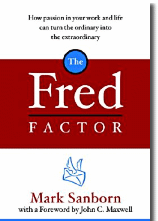|
|
|
|
(continued from previous page)
In today's economy, a high-school or college graduate should expect to be unemployed a few times during his or her career. But that unemployment will be brief as long as the individual is employable. Being employable means having a skill set that makes you desirable to any employer, regardless of industry or geographic location.
So what does that skill set look like? Many factors contribute to employability, but I am convinced that the most critical skill is the ability to create value for customers and colleagues without spending money to do it. The trick is to replace money with imagination, to substitute creativity for capital.
Sanborn's Maxim says that the faster you try to solve a problem with money, the less likely it will be the best solution. With enough money anyone can buy his or her way out of a problem. The challenge is to outthink rather than to outspend the competition.
In the world of business, the competition is either inside or outside the organization, and sometimes both. For example, you may be competing for a better position in your department or company. While professional decorum might prevent you from describing it this way, you hope that the best man or woman for the job will get it, and you're working to prove you're that person.
Or there may be an identified competitor in the marketplace. Once, when I spoke at a conference cosponsored by a delivery service that considers the U.S. Postal Service a competitor, I was for-bidden to use the story of Fred in my presentation. (It struck me as odd that the company wouldn't want me to use Fred as an example of the kind of service it aspired to and encouraged all of its employees to deliver. But that's the topic of another book!) Because Fred's employer competes for revenue against alternative carriers, Fred either helps or hinders the cause of his company. Most employers recognize that Fred is the kind of employee who will give them a competitive advantage.
But I'm not sure Fred (or his employer) really thought about competition in the traditional sense. Fred is more likely living proof that there is another less observable competitor: "the job we could have done." The truth is that we compete against our own potential every day. And most of us fall short of what we are capable of doing or being.
I may never understand all that motivates Fred, but I suspect the gratification he gets from excelling in his work and service is a big factor, as is the joy he consistently creates in his customers.
At the end of each day, Fred has beaten a silent opponent that threatens his potential, just as it threatens yours and mine. That competitor is mediocrity, a willingness to do just enough and nothing more to get by.
And while this competitor may not beat you out for a job promotion or take away corporate market share, mediocrity will just as surely diminish the quality of your performance and the meaning you derive from it.
PRINCIPLE 4: YOU CAN REINVENT YOURSELF REGULARLY
Here's something to consider: If Fred could bring such originality to putting mail in a box, how much more could you and I do to bring originality to what we do? How can we reinvent ourselves and our work?
There are days when you wake up tired. You figure you've read the books, listened to the audiotapes, watched the videos, and sat through the training sessions. You're doing everything you can possibly do to produce personal excellence, but you're still fatigued and unmotivated. When your life is at low tide, when your professional commitment is wavering and you just want to get the job done and go home at the end of the day, what can you do?
Here's what I do: I think about the guy who used to deliver my mail. Because if Fred the Postman could bring that kind of creativity and commitment to putting mail in a box, I can do as much or more to reinvent my work and rejuvenate my efforts. I believe that no matter what job you hold, what industry you work in, or where you live, every morning you wake up with a clean slate. You can make your business, as well as your life, anything you choose it to be.
That's what I call the Fred Factor.
Chapter Three
FRED SIGHTINGS
There comes a special moment in everyone's life, a moment for which that person was born. That special opportunity, when he seizes it, will fulfill his mission–a mission for which he is uniquely qualified. In that moment, he finds greatness. It is his finest hour. —WINSTON CHURCHILL
Now that I've explained the qualities of a typical Fred, you will better understand why I enjoy discovering Freds wherever I go.
I love Starbucks coffee and rarely start my day without it. One morning as I was driving to Denver International Airport, I swung by Starbucks for my favorite drink, a grande (a really large cup of steaming coffee).
(continued on next page)
|
|
|
|
The Fred Factor
by Mark Sanborn
Buy online:
$10.02
Copyright © 2004
by Mark Sanborn
Published by
Currency a division
of Random House
|
|
|
